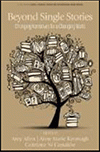
Beyond Single Stories
Changing Narratives for a Changing World
Edited by:
Amy Allen, Virginia Tech
Anne Marie Kavanagh, Dublin City University
Caitríona Ní Cassaithe, Dublin City University
A volume in the series: Social Science Education Consortium Book Series. Editor(s): Whitney G. Blankenship, San Antonio College. Matthew T. Missias, Grand Valley State University. Anne Aydinian-Perry, University of Wyoming. Dean P. Vesperman, University of Wisconsin-River Falls.
Published 2024
Every social studies curriculum tells a story. It is increasingly apparent that new stories are needed to guide us through the multiple and intersecting crises that have come to define our times. This accessible volume supports student teachers, teachers, and teacher educators to engage critically with the stories that social studies curricula tell and neglect to tell, particularly those that relate and contribute to the root causes of contemporary social and ecological injustices.
A balanced and inclusive curriculum necessitates a broad range of stories and perspectives, not just the master narratives of dominant groups. Incorporating a range of pedagogical approaches and spanning a diversity of themes, from representations of Africa in Chinese textbooks, to slavery and the American civil rights movement, to refugees and the role of indigenous knowledge systems in addressing climate breakdown, this volume includes and creatively engages with previously marginalized and silenced stories and perspectives. Both practical and theoretical in its approach, it seeks to provoke, meaningfully support, and inspire educators to incorporate alternative stories or counter-narratives into their social studies teaching.
This unique volume is essential reading for student teachers, teachers, teacher educators as well as anyone interested in inspiring children and young people to be open-minded, critically engaged, and empathetic agents of change, committed to addressing realworld social and ecological injustices.
CONTENTS
Introduction—Disrupting Single Narratives Through the Power of Story, Amy Allen, Anne Marie Kavanagh, and Caitríona Ní Cassaithe. SECTION I: NATIONAL HISTORY, CONTROVERSIAL ISSUES, AND HISTORICAL THINKING. Disrupting a Single Story About Refugees Through Teaching About An Gorta Mo r, the Great Hunger in Ireland, Heidi J. Torres. Navigating the Turbulent Waters of National History Teaching in Quebec: Addressing and Problematizing Controversial Issues Historically, David Lefrançois and Marc-André Éthier. Student Teaching Controversial Irish History in England Versus Northern Ireland: Context, Identity, and Emotion, Judith L. Pace. One Story Does Not Fit All: Ethnic Studies and Civic Counter Narratives in Elementary Social Studies, Abigail L. Stebbins. SECTION II: INDIGENEITY, AGENCY, AND PLACEBASED EDUCATION. Seeing the World Through Alternative Eyes: Using Indigenous Stories and Knowledge to Teach About Socio-Ecological Issues, Anne Marie Kavanagh and Caitríona Ní Cassaithe. An Ecological Future: Hearing the Voice of the Natural World in Our Collective Story, B. Scott Durham. Multiple Perspectives and Place-Based Education as a Catalyst for Social Change, Amy Allen. Trail of Tears, Redondo, Land Rights, and Boarding Schools: Centering Indigenous Perspectives to Move Beyond Single Stories, Karen Guerrero, Melissa Mercado, Ashley Alarcon, and Margarita Jimenez-Silva. SECTION III: EUROCENTRISM, WHITENESS, TEXTBOOKS, AND STANDARDS. Simplistic, Romanticized, and Eurocentric: The Narratives of Africa and Black History in a Chinese History Textbook, Chenyu Li. How Do We Center Equity? Examining the Stories Teachers Tell in Elementary Social Studies Classrooms, Tracy C. Rock, Laura K. Handler, and Patti Brooks. Whose Greatest Story is Ever Told: Historical Agency in Evangelical Christian American History Textbooks, Anne Aydinian-Perry, Matthew T. Missias, Dean P. Vesperman, and Whitney G. Blankenship. Crafting Standards While Attempting to Move Beyond the Single-Story, Daniel T. Bordwell. About the Editors. About the Contributors.
-
Paperback979-8-88730-508-0
Web price: $45.04 (Reg. 52.99)
-
Hardcover979-8-88730-509-7
Web price: $80.74 (Reg. 94.99)
- eBook979-8-88730-510-3

- EDU029040 - EDUCATION: TEACHING METHODS & MATERIALS: Social Science
- EDU040000 - EDUCATION: Philosophy & Social Aspects
- EDU053000 - EDUCATION: Training & Certification
-
 (Re)Envisioning Social Studies Education Research
Current Epistemological and Methodological Expansions, Deconstructions, and Creations
(Re)Envisioning Social Studies Education Research
Current Epistemological and Methodological Expansions, Deconstructions, and Creations
-
 Democracy at a Crossroads
Reconceptualizing Socio-Political Issues in Schools and Society
Democracy at a Crossroads
Reconceptualizing Socio-Political Issues in Schools and Society
-
 Fostering Diversity and Inclusion in the Social Sciences
Fostering Diversity and Inclusion in the Social Sciences
-
 Out of Turmoil
Catalysts for Re-learning, Re-Teaching, and Re-imagining History and Social Science
Out of Turmoil
Catalysts for Re-learning, Re-Teaching, and Re-imagining History and Social Science
-
 Personal Truths
Youth Utilizing Artmaking to Promote Diversity, Equity, Inclusion, and Belonging
Personal Truths
Youth Utilizing Artmaking to Promote Diversity, Equity, Inclusion, and Belonging
-
 The Divide Within
Intersections of Realities, Facts, Theories, and Practices
The Divide Within
Intersections of Realities, Facts, Theories, and Practices
-
 The Handbook for Aspiring Higher Education Leaders
The Handbook for Aspiring Higher Education Leaders

